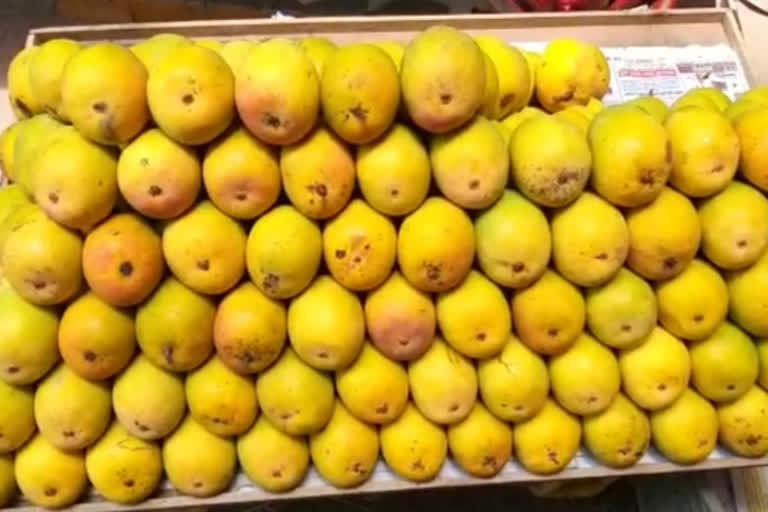Ratnagiri (Maharashtra):The Centre has proposed a ban on 27 pesticides and has sought suggestions within 45 days. Farmers, however, are hesitant about this as many of these pesticides are used by them. Mango farmers also use 8 to 10 of these pesticides. Also, the pesticides currently in use are within the reach of the farmers, but if these pesticides are discontinued, they will have to buy more expensive pesticides for which they will have to spend extra.
Mango farmers divided over government's pesticide ban in Maharashtra However, because the government is considering banning these pesticides as they are regarded to be dangerous for humans and animals, so farmers should accept this, said one of the mango farmers.
The pesticides currently being used by mango farmers are generic pesticides made in India and available at an economical cost. Their prices are also within the reach of local farmers.
- Of these, Quinalphos is a pesticide used for insects on mangoes, which costs Rs. 400 per litre.
- Carbendazim powder is used to treat fungus on mango trees which are sold at Rs.500 per kg.
- Chlorpyrifos is used for drying insects, and this pesticide costs Rs.400 per litre.
- Fenacucarb is used for mango blight, costs Rs 550 a litre.
- While Deltamethrin is used for insects, this pesticide costs Rs 600 per litre.
"Mango growers have been using these pesticides for the last several years. The results have been good so far, so there is a huge demand for these pesticides amongst mango farmers," says Mohinder Bamne, owner of Nandai Agroshop, a leading company in Konkan, and himself with an MSc in agriculture. "Also, if these pesticides are banned, farmers will have to buy pesticides costing Rs 2,000 to Rs 3,000 per litre, which will cost farmers four to five times more than the current ones," Bamne said.
When asked about this to mango orchard owner, Prasanna Pethe, he said that the pesticides in use now are affordable and give results to the farmers.
"However, some of these pesticides remain in the water or in the soil for many days and if such pesticides are to be banned by the government, farmers should accept them," Pethe said.
He further said that the government should ban as many dangerous pesticides as possible without imposing a total ban. Pethe has also demanded that pesticides which do not affect people or land should be exempted from the ban.
Also read:Octogenarian held hostage in hospital over non-payment of bill
Cost of pesticides on mangoes
If good and the proper amount of pesticide is to be sprayed on mangoes, mango orchard owners pay between Rs. 2.25 to 2.50 lakh per 100 trees to farmers. Some farmers spray pesticides even for Rs.1 to 1.5 lakh. But if proper pesticide spraying is done, it also has a good effect on production growth. As the yield increases, so does the quality of the fruit. But if the pesticide is not sprayed, it also affects the product. Where 500 boxes of mangoes were available, only 200 to 250 boxes of mangoes are available. That means there is a difference of about 50 per cent of the product quantity, but there are black spots on most mangoes. As a result, its quality declines. Naturally, farmers say it is affecting their finances.
Mango is mainly exported from Mumbai. About 38,000 to 40,000 metric tonnes of mangoes are exported from India every year, of which the Alphanso variety accounts for 15 to 20 per cent. This means that about 7 to 8 thousand metric tons of Alphanso are exported. Bhaskar Patil, deputy general manager at Maharashtra State Agricultural Marketing Board (Konkan Division) said that mango has been exported to Middle Eastern countries as well as England, Europe, USA, Australia, New Zealand, South Korea, Japan.
But mango exports are mainly to Middle Eastern countries. This year, however, the coronavirus affected the export of mango. Air traffic was completely shut for the last two months. As a result, the countries to which mangoes were exported by air could not be exported this year. So this year's exports went to the Middle East as well as Europe by sea.
During the period from April 1st to May 19th, 2019, the export of mango from Maharashtra was 16,746 metric tonnes. Considering this year, from April 1st, 2020, to May 19th, 2020, 8,640 metric tones.
Tons of mangoes have been exported. Although mango exports have decreased by 52 per cent over the previous year, Alphanso mango is a major contributor to these exports. Apart from the Alphanso variety, the other varieties exported include Kesar, Veganpalli, Totapuri, Badami and mangoes produced in other states. But this year, the mango exports from Mumbai have been mainly Alphanso. Because this year, there were difficulties in getting mangoes to Mumbai from other states.
The lockdown closed state borders. Market committees were also closed. So mangoes from other states were not easily available to exporters. Therefore, the Alphanso variety was the major contributor to exports from Mumbai this year. Patil also said that the exports were mainly to the Middle East as well as Europe by sea. Therefore, even though the export of mango has declined this year, it is the Alphanso mango, that has beaten the other varieties in the race to be exported the most.
